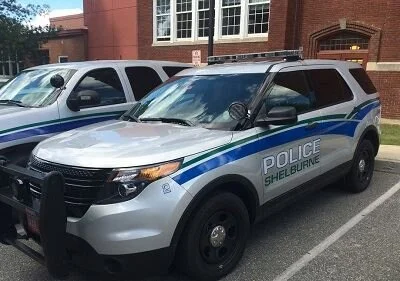Don’t leave it to beaver: Selectboard agrees to try pilot deterrent project
Beaver activity along Webster Road was captured by Sharon MacNair this spring. Courtesy photo.
Beaver activity along Webster Road has prompted Shelburne town officials to take the first steps toward considering how it handles wildlife situations with the hope of using non-lethal tactics to deal with nuisance animals.
The Shelburne Selectboard Tuesday agreed to a pilot project with a local animal rights group and a Vermont company that makes devices to deter beavers from building dens. In May, local residents, including representatives of Green Mountain Animal Defenders, called attention to beavers building a dam near the south end of a culvert under Webster Road.
While the state of Vermont allows for the killing of problem beavers, it has in recent years stopped issuing licenses it required to relocate the animals. According to Kim Royar at the Department of Fish and Wildlife, relocation is no longer a viable option because there are few good habitat options for displaced beavers and any cleared desirable spots will likely attract new beavers anyway.
After learning of the beaver activity, the town highway department handled the situation as it usually does – by killing and removing the animals, according to selectboard chair Jerry Storey.
But the selectboard said it was open to trying other methods of handling beavers.
“Trapping and killing has been the historic practice, but it’s now been discontinued,” Storey said. “The experts are very persuasive on this. That place will be recolonized, so we’re looking at other solutions.”
The board decided to take the wildlife group up on its offer to pay for a trial approach with the help of Beaver Deceivers, a Grafton, Vt., company. Owner Skip Lisle attended Tuesday’s board meeting to explain the device he uses to discourage beaver den construction from becoming too large and creating obstructions along waterways.
“I grew up near a pond in the 1970s,” Lisle explained. “Back when I started, it was literally just a fence. Now I’ve got piping, and filtration on the end supplementing that.”
Lisle’s devices allow water to flow through the dams without damaging them, keeping the water level from rising. Because beavers use water levels as cues to continue building, this keeps both the dam and the water at a manageable level.
“Thousands of species, a whole ecosystem, are enabled by beavers,” Lisle said. “A whole ecosystem that disappears if you kill the beavers since the dams have to be maintained. I got into this work since I want to create excellent habitat and help beavers, then I found out that it saves towns massive amounts of money as well.”
Shelburne resident Sharon MacNair is president of Green Mountain Animal Defenders and supports Lisle’s approach.
“Skip has an excellent track record and his reputation precedes him,” she said. “People say ‘These devices fail all the time,’ but they aren’t the kind of thing you can just replicate without experience. If you just have someone throw one in there, of course it’s going to fail.”
Storey said he would like to see the town strike a balance.
“To me, [beavers] are a very dangerous situation. But wildlife is a very important part of our way of life,” he said noting that the new town plan addresses wildlife and preserving habitat. “The question is, are there things we can do to enhance animal habitat? What is best practice for human/animal interaction?”
Also in attendance Tuesday was former selectboard member and wildlife veterinarian Dr. Josh Dein, who said he considers the beaver pilot project a good step toward improving the town’s overall approach to wildlife encounters.
“You can’t deal with wildlife-human conflict on an ad hoc basis,” Dein said. “If you don’t have policies and procedures in place so that employees know what to do in these situations, and right now there isn’t any … It’s significant that the chair said that this would be a topic in the future.”
Town highway workers will first remove debris from the beaver construction ahead of Lisle installing his device. Landowner David Webster was at Tuesday’s discussion and asked to be involved in the project. Although the activity is in the town highway right of way, the results could have an impact on his property, he said.








